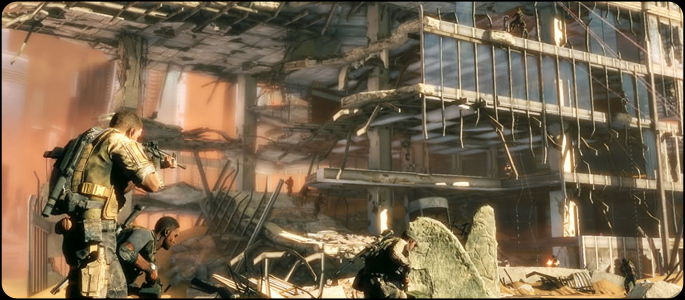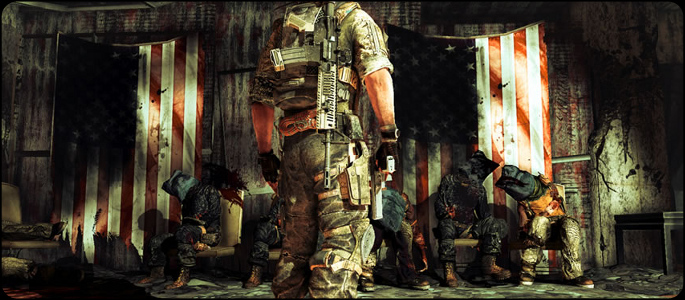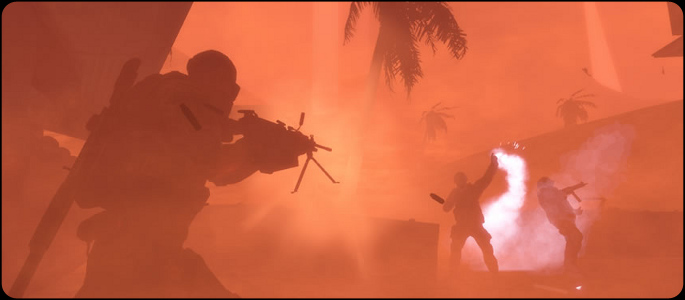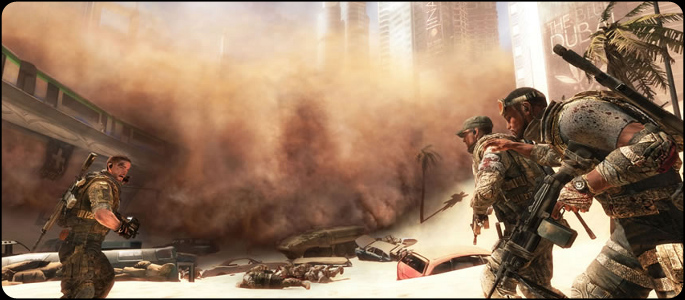In a world of Medal of Honors, Battlefields, and Call of Dutys, a game with a name as generic as Spec Ops: The Line is easy to overlook. But take five minutes to get a feel for the destroyed-by-sandstorm Dubai, and the old adage “never judge a book by its cover” never rings truer.
The spectacular, lavish city of Dubai has been leveled by catastrophic sandstorms, decimating the population and burying the once towering skyscrapers in layers of sand. A lone team, the 33rd, led by Colonel John Konrad, against strict orders to evacuate, stay behind to help the remaining living civilians to escape the crumbling city. Except something goes extremely wrong, and Konrad and his team lose contact with the United States… until a distress signal is intercepted, and Captain Martin Walker and his team are sent in to investigate.
Walker, voiced by Nolan North, and his team equally evoke feelings of camaraderie and mutiny, as things get so bleak at points, forcing their hand to make hard decisions—decisions that they may or may not live to regret.
Dubai, however, is the real star of Spec Ops: The Line, and it’s easily one of the most diverse, detailed, and well-built landscapes of this generation. Sand and sandstorms play the supporting role, changing the flow of battle at any given moment, becoming both an obstacle and an opportunity. At times, the blowing sand, coupled with intense glare of the beating sun, can reduce visibility to a mere few feet—all while in the midst of sprawling battlefields and gunfire. Other times, you can use the sand to your advantage, shooting out windows in hotels allowing a tidal wave of sand to come rushing inward, swallowing up enemies whole. Lighting can alter visibility as well, and is some of the best I’ve seen. In the broad daylight or in a dark, sunken corridor, lighting is just as impressive.

Gunplay is satisfying, and the cover system is excellent. It’s not simply duck and shoot. Vaulting over a wall with a dropkick to your enemies face is pure badass, but wait too long behind cover and the incoming enemy bullets will reduce a seemingly steady stronghold to dust, exposing you to the onslaught. Weapons vary enough, feel weighty and punchy, and must be used down to the last round due to the overwhelming advance of enemy soldiers. There is little downtime between firefights, keeping the blood-pumping action high throughout.
The story is convoluted, and at times downright confusing, as it’s hard to know who it is you’re fighting against. There’s insurgents, there’s the CIA, and you end up facing off against the 33rd, the squad that you’re risking your neck to save. But the sand and your own internal struggles are the most formidable foes you’ll encounter.
The game gives you choices—difficult ones—that affect the outcome and story in minor ways. It has more effect on you, as the player and as Captain Walker and his team. Do you save the civilians, or do you save the informant vital to your mission? These things weigh heavily on the characters and the team dynamic, and make for some enthralling cinematic cutscenes. But it also stands as a flaw. As the team argues about how they’re there to save people—and at one part, the entire team is deeply shocked by extreme and atrocious acts of violence at their own hands—the very next scene they’ll stomp and splatter the face of a defenseless downed soldier. Why question your violent acts if you’re only going to become increasingly violent? There is a point to be made about the circumstances and the effect war can have on a soldier, but a lot of it is completely gratuitous.

Another annoyance that stood out sorely is the fact that the game features the most well-known voice actor in the industry, has stellar script-writing and acting during all scenes and battlefield banter, but then you give Nolan North only a handful of lines during gunplay. Hearing Walker scream “reloading” and “tango down” what felt like hundreds of times diminished the overall experience. As did the over-reliance of F-bombs in the dialog. Profanity is natural in such a heated situation, but really…if even I—known for having a potty mouth myself—started to grimace at the amount of F-bombs being dropped, then it’s being abused. Even “tango down” eventually turns into “tango the fuck down”. It’s just nonsense and feels like the writers are trying too hard to portray the severity of it all. The landscapes, the set-pieces, the dialog, the soldier’s action—already does a fine job of that.
The shocker of an ending is a complete mindfuck, and the following epilogue even has you questioning how you will react to certain situations. It’s enough that it made me want to play the 5- to 6-hour campaign again, right away, just to see what other choices I could have made, and if there are any hints during the game that I missed that point toward this crazy closure.

There’s more replay value than that, because there are plenty of online modes, and a robust ranking system and loadout customization. Unfortunately, I didn’t have much time playing these actual modes because the servers were empty, but I’m sure that as of today they’ll liven up. What I did play lacked the same charm as the single-player campaign, but still used the same great gameplay mechanics and used similar backdrops. The majority of it is standard fare—deathmatch, TDM, capture the flag, etc.—but there’s another interesting mode that has you taking out vital points to reveal high-value targets. Co-op is promised, and anyone who purchased Spec Ops: The Line will be able to download it as free bonus content.
Spec Ops: The Line probably isn’t high on anyone’s list of must-play games, but it should be. From the moment I turned it on, it took me by surprise. The setting of a once luxurious, sand-covered Dubai is a true stroke of genius, and makes for both gameplay and story situations that are a cut above the norm—especially when it comes to cookie-cutter military shooters. The summer is here, but before the drought can start, Spec Ops: The Line is the last game you should buy before the heaviest hitters arrive this holiday season.
PlayStation LifeStyle’s Final Score
+Sand can be both obstacle and an opportunity. -Story is all over the place. |
 |
–








